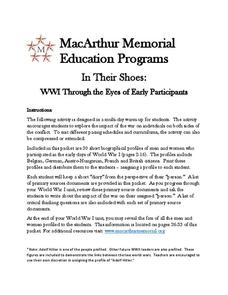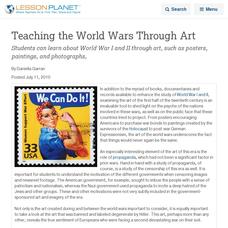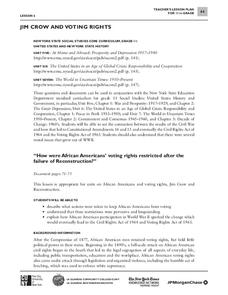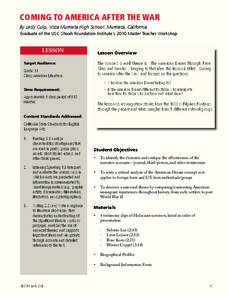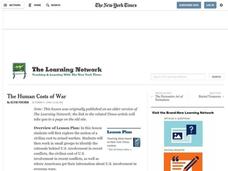Curated OER
Hiroshima: Question Answer Response Strategy (QAR)
“The crux of the matter is whether total war in its present form is justifiable. . .” After reading “The Aftermath,” the final chapter of Hiroshima, class members use a Question Answer Response (QAR) strategy to reflect on issues raised...
Curated OER
Anti-Semitism Workshop
Originating from the Yad Vashem Holocaust Memorial Museum in Jerusalem, here is a resource to support your world historians in their study of World War II, the Holocaust, your cultural scholars learning about anti-semitism, or your...
Curated OER
Women and World War II
Students determine the influence of World War II on women's roles in society. Students research the answers to questions about how women were able to enter jobs that had not been open to them before the war and how this affected society....
MacArthur Memorial
In Their Shoes: WWI Through the Eyes of Early Participants
Several social activities provide showcase the perspective of many prominent figures in World War I history. Students read an assigned case study about a memorable person and complete several activities to further understand this...
Curated OER
Lead Up to World War II
Twelfth graders examine Hitler's rise to power leading up to World War II. and how the Treaty of Versailles contributed to Hitler's rise to power in Germany. They identify the important countries involved in the beginning of World War II.
BAE Systems
The Cold War
The Soviet Union's decision to block West Berlin from access by the Western allies began an international hostility that extended into the rest of the twentieth century. Class members examine both Harry Truman's and Joseph Stalin's...
Curated OER
Impact of the End of World War II on Japan
Ninth graders examine and discuss reasons United States occupied Japan after surrender in World War II, view photographs of Japan at end of War and explore how U.S. occupation affected Japan's political, economic, and social systems, and...
Curated OER
The Consequences of World War II
Ninth graders explore the aftermath of World War II. In this World War II lesson, 9th graders investigate the consequences of the war as they complete a post-assessment project that requires them to compose essays on the topic.
Curated OER
World War II: Causes and Consequences
Tenth graders examine Hitler's occupation of Europe and the Allies' efforts to fight it. For this World War II lesson, 10th graders examine how World War II changed American society, especially for women. Students analyze a...
Curated OER
The 1920s and World War I
In this global studies worksheet, students read the noted pages in their textbooks and then respond to 8 short answer questions and write a thematic essay about the 1920's and World War I.
Curated OER
The Blues: The Father of Rock And Roll
Students examine influence The Blues had on Rock and Roll and the concomitant social, political, and economic factors and movements during the post-World War II period. Students then research and create multimedia reports on...
Curated OER
Teaching the World Wars Through Art
Students can learn about World War I and II through art, such as posters, paintings, and photographs,
Curated OER
World War II and the Cold War
In this global studies worksheet, students read the noted pages in their textbooks and then respond to 12 short answer questions about World War II, the Cold War, and economic divisions.
Curated OER
World War II, India, Gandhi, and Pakistan
In this Asian studies worksheet, learners read the noted pages in their textbooks and then respond to 12 short answer questions about Southeast Asia, World War II, Gandhi, India, and Pakistan.
Alabama Department of Archives and History
A College Student's Perspective on WWI
Some things remain the same, such as the world being on the brink of war, or college attendees writing home requesting money. As part of their research into events that led up to President Wilson's declaration of war on...
Worksheet Web
Analyzing the Text
Practice analyzing informational text with a reading passage that details the Great Depression. Scholars read about the impacts of World War I, the Roaring Twenties, and the Depression, then answer 10 true or false questions.
National Woman's History Museum
Getting with the Program
A seven-step lesson introduces the emergence of computer sciences and the contributions women made to the profession after World War II. Several science experiments offer pupils a hands-on learning experience that showcases parabolas,...
City University of New York
Jim Crow and Voting Rights
Class groups examine primary source documents to determine how the voting rights of African Americans were restricted after the failure of Reconstruction, and how African American participation in World War II lead to change.
Alabama Department of Archives and History
Alabama and the Treaty of Versailles
As part of a study of the treaty that ended World War I and the seeds of resentment it planted, class groups compare President Wilson's Fourteen Points and the articles of the Treaty of Versailles.
Curriculum Development Institute
Factors for Economic Integration in Western Europe since 1945
While the European Union has been a part of economic landscape for decades, it grew out of a period of economic integration after World War II. Using a round table method, class members analyze and discuss the events leading up to the...
University of Southern California
Coming to America After the War
As part of their exploration of the American dream, class members examine primary source materials to compare immigrant experiences of those arriving early in our country's history to those arriving in the US after World War...
Curated OER
"The New Television Set" a Gateway to the Post World War II Era
Eleventh graders demonstrate their knowledge of the effects of television on the political, economic, religious, social, intellectual and artistic life of the US nation from the 1950's. Research how television shaped public opinion with...
Curated OER
The Human Costs of War
Students explore the concept of civilian cost to armed warfare. They explore the role of the military, civilians and of press coverage during armed conflicts, creating posters illustrating their research on post-WW II military conflicts.
University of California
Decolonization
The ripple effect from one small event can impact many others. Young historians research the ripple effect World War II had on decolonization in the second installment of an eight-part series. Through primary and secondary documents as...



